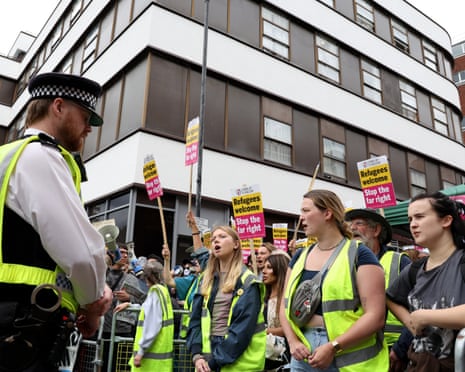Politics
Protest Highlights Divide Over Refugee Support in London

Earlier this month, a protest in London attracted significant attention as approximately 800 demonstrators gathered to support refugees residing at the Thistle City Barbican hotel. The event was organized in response to an anti-refugee demonstration across the street, where around 250 individuals rallied for the closure of the hotel. The opposing groups presented sharply contrasting views on migration and asylum seekers, illuminating deep societal divisions.
Participants in the anti-refugee protest used charged language, referring to asylum seekers as “illegal,” “invaders,” and “parasites.” In response, those supporting the refugees chanted “Nazi scum, off our streets” for over an hour. While this expression of contempt aimed to counter the rhetoric of the opposition, many observers, including protest organizer David Renton, have questioned the effectiveness of this approach.
Renton argues that labeling opponents as fascists is unlikely to resonate in today’s climate, where such terms can lack the intended impact. He notes that while there were indeed far-right individuals present at the protest, they were not the main organizers. Instead, he suggests that the movement surrounding figures like Tommy Robinson is more complex than simply being labeled as fascist. Robinson, associated with a controversial past, does not align with the historical fascist imagery that once defined such movements.
The effectiveness of the “fascist” label is further complicated by the wider political context. Recent statements by Keir Starmer, the leader of the Labour Party, reveal a trend in mainstream politics that frames migration negatively. Starmer’s public comments throughout August have consistently described migration as problematic, referring to it as “illegal” or linked to criminal activity. This framing reinforces the narrative presented by anti-refugee groups, allowing their rhetoric to gain traction.
Since the protest at the Thistle City Barbican, the anti-refugee movement has continued to maintain its momentum. Observers note that calling opponents “Nazis” does little to undermine their confidence, as many within the movement do not identify with such labels. Instead, they often dismiss the term as exaggerated or laughable.
In the past, former supporters of far-right groups have distanced themselves from such movements, often citing fascism as a reason for their exit. Renton reflects on historical accounts, such as one from a former member of the National Front in the 1970s, who left after witnessing overtly fascist imagery. Today’s far-right movements, however, are characterized by a new dynamic that includes a focus on female leadership and a singular narrative about refugees.
The contemporary far-right narrative links refugees, particularly single men, to negative stereotypes, including the unfounded perception that they are likely to be sexual predators. This argument is not only unfounded but also reflects an underlying racism that characterizes many anti-refugee sentiments. Renton argues that the real challenge lies in confronting these harmful stereotypes head-on.
To effectively counter the anti-refugee protests, Renton advocates for reframing the discourse. He emphasizes the importance of highlighting statistics that expose the hypocrisy of the far-right. For example, a significant portion of individuals attending far-right protests have been reported for domestic violence, suggesting that the real issue of violence against women is not linked to refugees but rather to those protesting against them.
With this in mind, he urges activists to adopt a more nuanced strategy, focusing on factual rebuttals rather than emotionally charged labels. By doing so, they can challenge the prevailing narratives and potentially shift public opinion regarding refugees and asylum seekers.
In conclusion, the divide over refugee support in London underscores the need for a strategic rethinking of how to engage with opposing views. As the anti-refugee movement continues to gain traction, advocates must reconsider their approach, moving beyond simplistic labels to foster a more informed and constructive dialogue.
-

 Health3 months ago
Health3 months agoNeurologist Warns Excessive Use of Supplements Can Harm Brain
-

 Health3 months ago
Health3 months agoFiona Phillips’ Husband Shares Heartfelt Update on Her Alzheimer’s Journey
-

 Science1 month ago
Science1 month agoBrian Cox Addresses Claims of Alien Probe in 3I/ATLAS Discovery
-

 Science1 month ago
Science1 month agoNASA Investigates Unusual Comet 3I/ATLAS; New Findings Emerge
-

 Science4 weeks ago
Science4 weeks agoScientists Examine 3I/ATLAS: Alien Artifact or Cosmic Oddity?
-

 Science4 weeks ago
Science4 weeks agoNASA Investigates Speedy Object 3I/ATLAS, Sparking Speculation
-

 Entertainment4 months ago
Entertainment4 months agoKerry Katona Discusses Future Baby Plans and Brian McFadden’s Wedding
-

 Entertainment4 months ago
Entertainment4 months agoEmmerdale Faces Tension as Dylan and April’s Lives Hang in the Balance
-

 World3 months ago
World3 months agoCole Palmer’s Cryptic Message to Kobbie Mainoo Following Loan Talks
-

 Science4 weeks ago
Science4 weeks agoNASA Scientists Explore Origins of 3I/ATLAS, a Fast-Moving Visitor
-

 Entertainment4 months ago
Entertainment4 months agoLove Island Star Toni Laite’s Mother Expresses Disappointment Over Coupling Decision
-

 Entertainment3 months ago
Entertainment3 months agoMajor Cast Changes at Coronation Street: Exits and Returns in 2025









